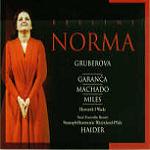You would not think that a part with as many low-lying and darkly exclamatory passages–not to mention one described by Lotte Lehmann as “more difficult that three Brünnhildes”–would find its way into the inventory of a great Zerbinetta and Queen of the Night, but you would apparently be wrong. And since coloratura Edita Gruberova recently has been taking on heavier parts such as Anna Bolena and Maria Stuarda, it probably was only a matter of time before she decided to add this bel canto pinnacle to her repertoire. The results are neither as tentative as some might have guessed nor as ideal as her legions of fans might have desired. Taped live at (I believe) a pair of concert performances in Baden-Baden in April and May, 2004, we now have recorded documentation of Gruberova, in her 36th year of singing in public, in this cruelly difficult and complex role.
The first worry would be whether or not she has the weight and dark color for the part, since there is little Linda-di-Chamounix-like chirping in Norma. From the first notes we hear good news: the middle of the voice has fine thrust, and as the opera goes on, the tone, darker than in previous years, is an asset. But the weight is still a size too light. Sutherland had it, without the chestiness needed; Sills lacked it entirely; Scotto used her artistry to make up for much. And of course, Caballé had it all, and Callas had it all and more.
Gruberova certainly has studied every nuance of the character and brings Norma to life–both woman and warrior. If anything, she overstates too many lines and mars them with bad habits–the worst is in the recitative with Adalgisa that precedes the “Deh con te” duet in Act 2. Each word is so preciously delivered, with either a diminuendo or crescendo, that she sounds insane. And she does a lot of sliding and swooping for effect; the mannerism becomes an event in itself and you find yourself cringing. (By contrast, Caballé’s habit of gushing into a note/word for dramatic effect is well under control.) Perhaps I’ve given too much weight to these tics, but I doubt anyone will fail to notice and dislike them.
However, for both thoughtfulness and virtuoso singing (aside from a bad-news high-D at the end of Act 1 and an E-flat capping the “In mia man” duet) her performance is remarkable. She sings “Casta diva” in its original key and infuses it with great stillness, and she embellishes the second verse of the cabaletta madly but stunningly. Her legato is ravishing and her stupendous breath control never fails her. The final moments of the opera are deeply moving, and when they come, we realize what a complete performance her’s has been, odd paroxysms and all.
The others in the cast are respectable enough, for the most part. The wonderful Alastair Miles turns in one of his few dull performances on disc as Oroveso (granted, not exactly Boris Godunov); he is neither warlike nor warm, but as ever, he sings handsomely. Tenor Aquiles Machado bravely attacks the high-C in his opening cavatina, but “attacks” is the operative word; elsewhere he sings expressively, making more of the text and predicament than most tenors, exhibiting a bright tone and, when needed, warm legato.
Mezzo Elina Garanca’s Adalgisa is close to world-class. She may not have the emotional openness that makes the character so special, but her tone is resplendent, from the intense top to the warm, round, non-aggressive bottom. She is particularly expressive in her part of the “Ah! Rimembranza!” duet. Her voice blends well with Gruberova’s and both duets are standout moments, as they should be. Oddly, they take the staccatos up to the very highest note in the cadenzas quickly; the effect is unusual but interesting. Ray M. Wade makes the most of Flavio, and Judith Howarth’s Clotilde is sympathetic.
In the pit, Friedrich Haider is a mixed blessing. His meticulousness is to be admired, he presents the score note-complete, and if you believe (cf: Richard Bonynge) that a good Norma conductor for the most part is there to support his Norma, then Haider is fine. He takes the cabaletta to “Casta diva” very quickly, and Gruberova’s fluency is brought full center. But he misjudges the choral scenes (save for the “Guerra” chorus, which he wisely ends without its pastoral coda): no one really wants to linger over the Druids’ entrance, do they? The orchestra plays very well.
This clearly isn’t anyone’s first choice of Norma. That remains “Callas über alles”, whether in the 1952 Covent Garden or 1955 RAI performance–or choose your own favorite. And after Callas is Caballé on BMG (with Cillario; 1972) or better yet, on the video from Orange in 1974 (VAI), which is about as great a performance as you’ll ever see “live”. And let’s not overloook Sutherland.
































